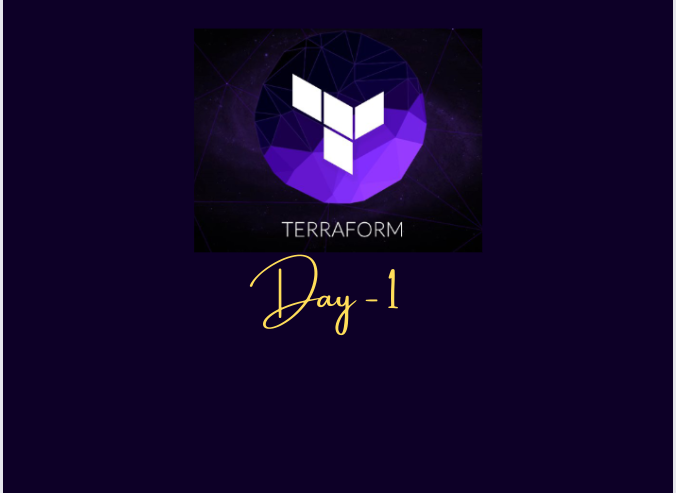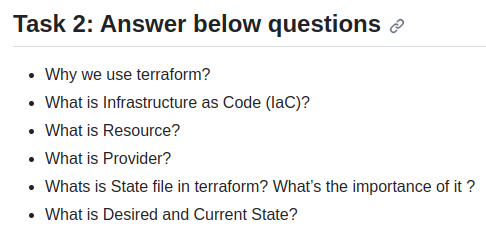DevOps, Day - 60
 Vrishni Shree V B
Vrishni Shree V B
What is Terraform?
Terraform is an infrastructure as code (IaC) tool that allows you to create, manage, and update infrastructure resources such as virtual machines, networks, and storage in a repeatable, scalable, and automated way.

Here is the Link
sudo snap install terraform --classic #for ubuntu users


Terraform is a popular open-source infrastructure as code (IaC) tool used for automating and managing the provisioning and configuration of infrastructure resources. Let's break down your questions:
Why use Terraform?
Terraform is used for several reasons:
Infrastructure as Code (IaC): It allows you to define your infrastructure in code, making it versionable, repeatable, and easily shareable.
Automation: Terraform automates the process of provisioning and managing infrastructure, reducing manual work and the risk of human error.
Multi-Cloud and Hybrid Cloud Support: Terraform can provision resources in various cloud providers (AWS, Azure, Google Cloud, etc.) and on-premises, making it ideal for multi-cloud or hybrid cloud environments.
Scalability: It can manage small to large-scale infrastructure deployments efficiently.
Dependency Management: Terraform understands resource dependencies and deploys resources in the correct order.
Infrastructure as Code (IaC):
Infrastructure as Code is a practice of managing and provisioning infrastructure using code or configuration files, rather than manual processes. IaC brings several benefits, such as repeatability, consistency, version control, and collaboration. Terraform is a popular tool for implementing IaC.
Resource:
In Terraform, a resource is a virtual or physical component of your infrastructure that you want to manage. Resources can be anything from virtual machines, networks, and databases, to cloud services, and they are defined in Terraform configuration files (usually written in HashiCorp Configuration Language - HCL).
Provider:
A provider in Terraform is a plugin that allows Terraform to interact with a specific cloud or infrastructure platform. Providers are responsible for translating Terraform configurations into API calls for the target platform. For example, there are providers for AWS, Azure, Google Cloud, and more.
State file in Terraform:
The Terraform state file is a critical part of Terraform's functionality. It is a JSON file that stores the current state of your infrastructure. It keeps track of which resources are created and their current attribute values. Terraform uses this state file to plan and execute changes to your infrastructure. It helps Terraform understand the delta between your desired state (configuration) and the current state of the infrastructure.
Importance of the State File:
The state file is crucial for several reasons:
Idempotent Operations: It ensures that Terraform can make changes incrementally without recreating all resources from scratch.
Resource Tracking: Terraform uses the state file to track resource dependencies and relationships.
Rollback and Recovery: It enables Terraform to recover from errors or failures during provisioning.
Concurrency Control: It helps prevent conflicts when multiple users are working on the same infrastructure.
Desired and Current State:
Desired State: This is defined in your Terraform configuration files (HCL). It represents the infrastructure state you want to achieve or maintain. When you run
terraform apply, Terraform will work to bring the current state closer to this desired state.Current State: This is the actual state of your infrastructure as tracked in the Terraform state file. It reflects the current state of resources in your environment. Terraform uses the current state as a basis to plan and make changes to reach the desired state.
Thank you so much for reading
Follow me on LinkedIn to see interesting posts like this : )
Subscribe to my newsletter
Read articles from Vrishni Shree V B directly inside your inbox. Subscribe to the newsletter, and don't miss out.
Written by

Vrishni Shree V B
Vrishni Shree V B
💻 Python | Docker | Jenkins | Networking | Git | Linux 💻 Passionate about leveraging technology to drive efficiency and deliver innovative solutions. Proficient in Python development, Docker containerization, Jenkins automation, computer networking, Git version control, and Linux administration. Skilled in collaborating with diverse teams to deliver high-quality software products. Proficient in AWS EC2 instance management and deployment. Seeking new opportunities to apply my expertise and contribute to impactful projects. Let's connect and explore how we can work together! Inter-personal Skills: Communication, Adaptability, Emotional intelligence, Active listening, Collaboration. Happy To Connect🔗😊 Feel free to reach me out😃@ --> vrishnishreevb531@gmail.com 📬